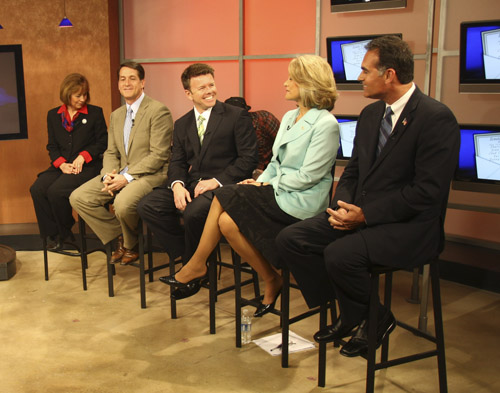Ideology v. pragmatism: It comes down to who can beat Harry

Sharron Angle speaks with Danny Tarkanian as Sue Lowden walks behind them after the Republican Senate candidates debated in February in Las Vegas. (John Locher)
Ah, the vicissitudes of a democratic republic in the throes of partisan politics.
Does one stand on principles and foundational philosophy or settle for the practicalities of who can win and do the least harm?
An alert reader, from Kansas no less, writes today with some commentary and insight in reaction to a Review-Journal column by Geoff Schumacher titled “The pitfalls of extremism.”
Schumacher concludes his ramble through the ideas and ideals of Sharron Angle and Rand Paul and Bobby Jindal with this statement, “When politicians embrace an extreme ideological view, left or right, they open themselves to the likely possibility that they will end up violating their professed principles in one way or another. Political reality is just too messy and murky — and too much in need of pragmatic solutions — to have much use for ideologues.”
But alert reader Tedd writes a counterpoint:
“It seems the message of ‘The Pitfalls of Extremism’ is ‘as long as “we” don't have any principles “we” don't run the risk of violating them.’
“I guess that's true, but I'd prefer a world of highly-principled people, rather than the unprincipled world of Washington politics we've witnessed over the last half century.
“If you consider the Founding Fathers, they were far more principled than most, but when they deviated from their principles and became pragmatic (slavery) that error resulted in a civil war. I think, contrary to the article, history shows it is the unprincipled, range-of-the-moment, majority-whim behavior that is destructive, not the principled leadership of liberty-loving leaders.”

Which logically brings us to today’s story by Laura Myers on our latest Mason-Dixon Polling & Research findings, which raises a question for Republican primary voters: It is not who can win the party nomination, but who can win in November against Harry Reid, left.
A week and a half from Election Day, while early voting is underway, it is still too tight to be certain. But the poll shows Goldwater-Republican Angle losing to Reid by 3 points and McCain-Republican Sue Lowden (I’m sure she’ll balk at that.) beating Reid by 3 points in a poll with a 4-point margin of error.
The poll also shows Reid far closer to his GOP rivals than the previous double-digit margin.
As Myers quoted Lowden's campaign manager as saying, "Ultimately, this primary is much more about November than it is about June."
What’s a Tea Party voter to do? Stand on principles or compromise for the sake of victory?

















